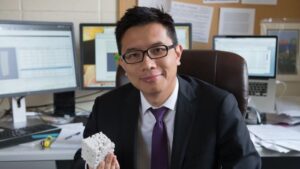https://s.uconn.edu/meseminar2/26/21
Abstract:
This talk will present a machine learning framework that builds interpretable macroscopic surrogate elasto-plasticity models inferred from sub-scale direction numerical simulations (DNS) or experiments with limited data. To circumvent the lack of interpretability of the classical black-box neural network, we introduce a higher-order supervised machine learning technique that generates components of elasto-plastic models such as elasticity functional, yield function, hardening mechanisms, and plastic flow. The geometrical interpretation in the principal stress space allows us to use convexity and smoothness to ensure thermodynamic consistency. The speed function from the Hamilton-Jacobi equation is deduced from the DNS data to formulate hardening and non-associative plastic flow rules governed by the evolution of the low-dimensional descriptors. By incorporating a non-cooperative game that determines the necessary data to calibrate material models, the machine learning generated model is continuously tested, calibrated, and improved as new data guided by the adversarial agents are generated. A graph convolutional neural network is used to deduce low-dimensional descriptors that encodes the evolutional of particle topology under path-dependent deformation and are used to replace internal variables. The resultant constitutive laws can be used in a finite element solver or incorporated as a loss function for the physical-informed neural network run physical simulations.
Biographical Sketch:
Dr. Sun is an associate professor at Columbia University since 2014. He obtained his PhD from Northwestern in 2011 and worked as a senior member of technical staff at Sandia National Laboratories from 2011-2013. His research focuses on theoretical, computational, and data-driven mechanics for multiphase materials with complex microstructures. He is the recipient of several awards including the IACM John Argyris Award, ICE Zienkiewicz medal Prize, the ASCE EMI Da Vinci Award, the NSF CAREER award, Young Investigator Awards from Army Research Office and Air Force Office of Scientific Research.
